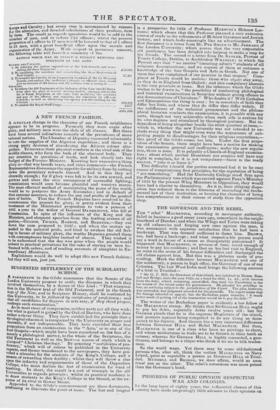SUGGESTED SETTLEMENT OF THE SCHOLASTIC SCHISM.
A PARAGRAPH in the Globe announces that the Senate of the London University propose to settle the dilemma in which they involved themselves, by a decree of this kind : "That examina- tion in the Hebrew text of the Old Testament, and in the Greek felt of the New, and in Scripture History, shall be instituted by this University, to be followed by certificates of proficiency ; and that all candidates for degrees in arts may, if they think proper, undergo such examination." As in most cases of compromise, neither party get all they wish; but what is gained is gained by the Oxford Doctors, who have done rather aclever thing. They have established the principle that a theological education is recognized by the University as proper and desirable, if not indispensable. They have extended their first proposition from an examination in the "Acts," or in one of the four Gospels—which might have been considered on the face of it merely a philological matter, to the whole of the Scriptures, the Old Testament as well as the New—a course of study which is sia.mped" Christian theology." By granting "certificates of pro- ficiency," which will of course be published in the University reports, and thence transferred to the newspapers, they have pro- vided a stimulus for the students of the King's College, and a means of rewarding their docility ; whilst they will throw a slur Upon the industry and acquirements of those of the Opposition College, who must decline the test of examination for want of teaching. In short, the result is a sort of triumph to the old Universities as regards principle ; whilst its practical tendency is to draw students to the King's College in the Strand, at the ex- pense of its rival in Gower Street. is a prospectus for 1828 of Professor Huawrris Hebrew Lec- tures; whtch shows that this Professor planned a very extensive
course of study in the refinements of Hebrew literature and Jewish
history, and which looks amazingly like an advertisement. The first document is a letter from Dr. INK SMITH to Mr. JERRARD of the London University ; which proves that the very respectable old gentleman has been deluded into helping to make a trap for his friends. The second is a letter from Dr. SADLER, Provost of Trinity College, Dublin, to Archbishop WHS.TELY; in which the Provost says that "we receive" (meaning admit)" students of all religious denominations; and we require of them at entrance a knowledge of the four Gospels and Acts in Greek. Not one of them has ever complained of our practice in that respect? Com- plaint at Trinity would be useless: those who object stay away, as they do in England from Oxford ; and this compulsory absence is the very principle at issue. But the inference which the Globe wishes to be drawn is, "the possibility of conducting philological and historical examinations in Scripture without giving offence to any denominations of Christians." Who doubts it ? With Catholics and Episcopalians the thing is easy ; for in essentials of faith they differ but little, and where they do differ they differ widely. If the indifference of the technical grammarian and the philoso- phical historian conducts the examination, it is possible with any sects, though not very achievable when each side is zealous for its own dogmas and stimulated by theological jealousy. But in- dependent of being altogether beside the strict question at issue,— which is, whether the new University was not intended to ex- clude every thing that might even wear the appearance of sub- jecting people to disadvantages for their religious convictions,— this proof of the Globe comes too late. Under the first propo- sition of the Senate, there might have been a motive for making the examination general and inoffensive; under the new regula- tion, thsre is none. It is palpably a Church-of-England examina- tion; about which neither Dissenters nor sceptics will have any right to complain, for it is not compulsory—there is the ready answer, " take it or leave it."
This difficulty (should the parties concerned feel it to be one) comes of compromising first principles, for the reputation of being "accommodating." Had the University College stood firm upon the Parliamentary vote which was carried against PEEL'S Ministry of 1835 by the present Whig Ministers in Opposition, they would have had a charter to themselves. As it is, their obliging dispo- sition has reduced them to the dilemma of rescinding the funda- mental law of their institution, or bearing the character of being less comprehensive in their course of study than the opposition shop.


























 Previous page
Previous page